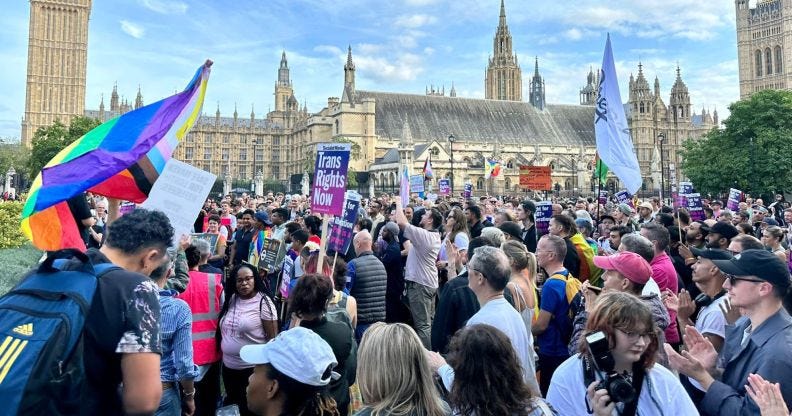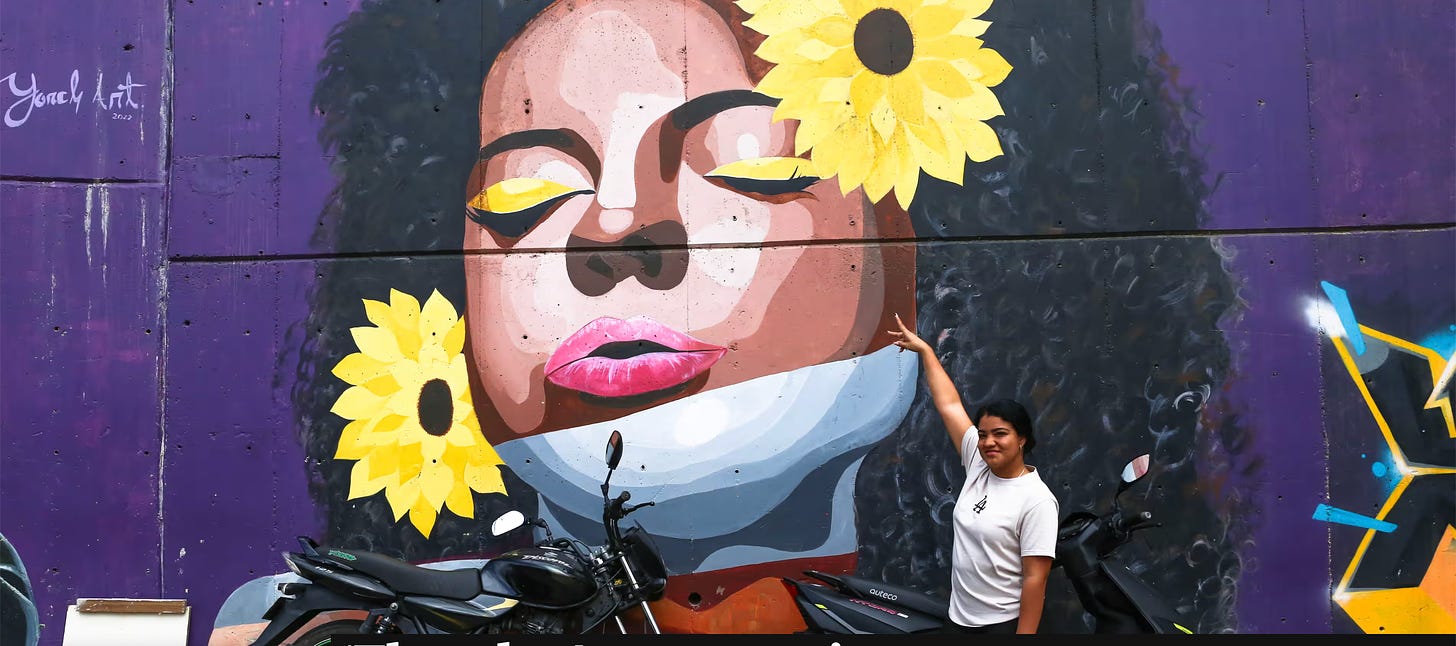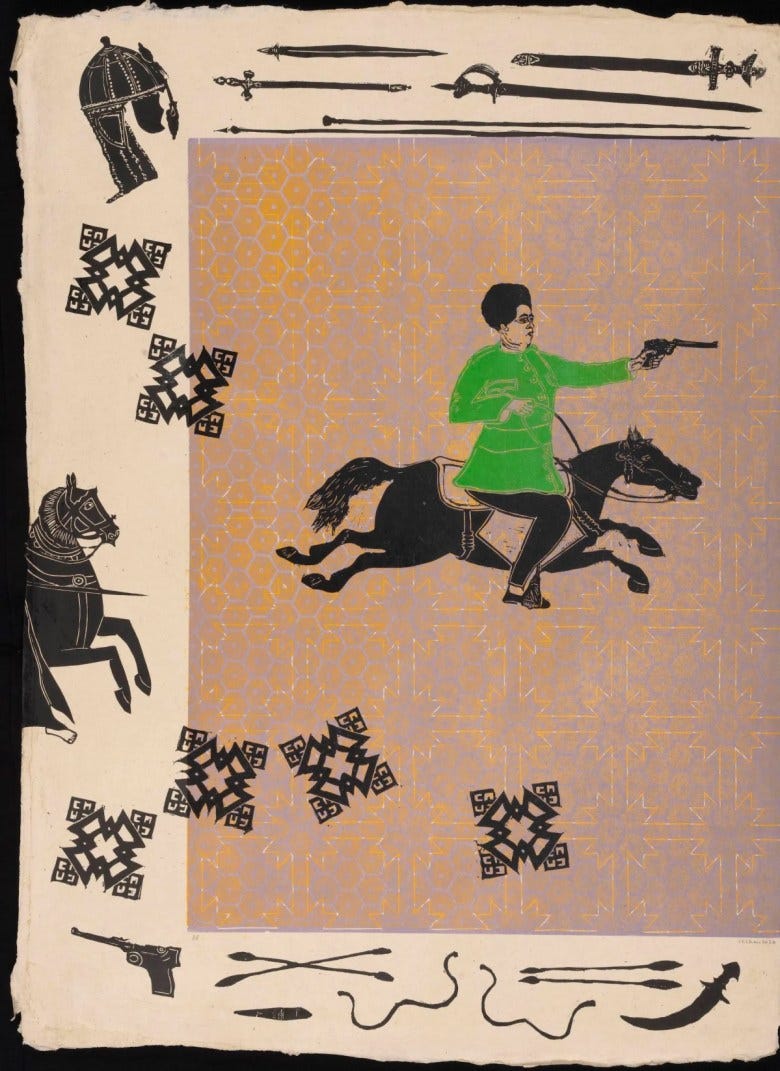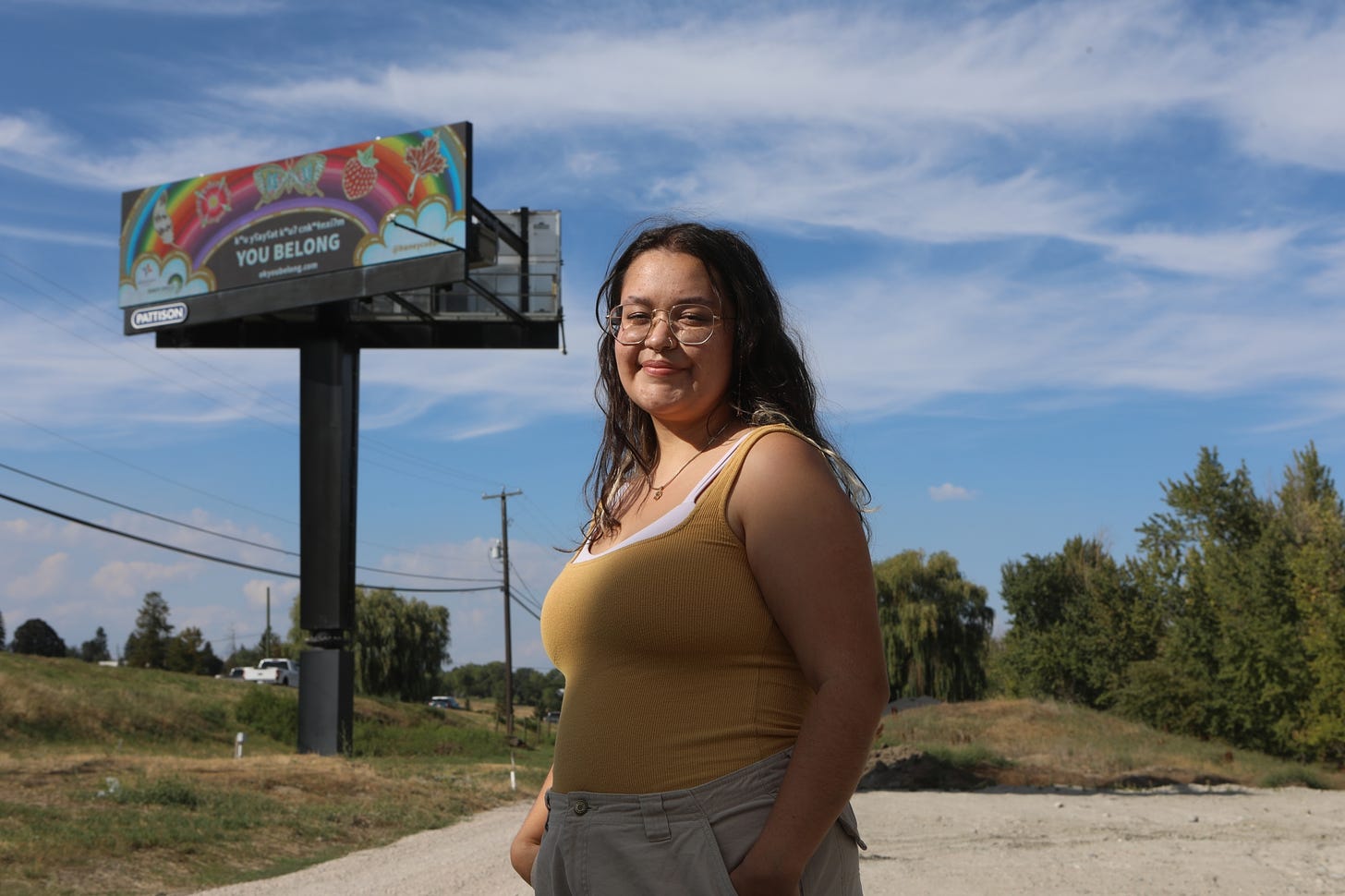Global Roundup: Latin America International Safe Abortion Day, UK ‘Stand Against Suella’ Protest, Colombia Women Graffiti Artists, Feminist Take on Cookbook, Two-Spirit Anishinaabe Artist Billboard
Curated by FG Contributor Samiha Hossain
A woman participates in an abortion-rights demonstration during the Day for Decriminialization of Abortion in Mexico City, Thursday September 28, 2023. AP Photo: Alexa Herrera
The streets of cities across Latin America were bathed in green as tens of thousands of women marched to commemorate International Safe Abortion Day last week. Latin American feminists have spent decades fighting to roll back strict prohibitions, although there are still few countries with a total ban, like El Salvador and Dominican Republic.
In Mexico, marchers celebrated the recent decision by Mexico’s Supreme Court to decriminalize abortions at the federal level. In Argentina, marchers had a more somber tone, worrying that the strength of a populist far-right presidential candidate going into elections in October could signal peril after years of work by feminists. Protesters also raised alarm about the region’s high rates of gender-based violence as well as abuses aimed at LGBTQ+ communities.
The march came just weeks after Mexico’s Supreme Court knocked down all federal criminal penalties for abortion, ruling that national laws prohibiting the procedure are unconstitutional and violate women’s rights. The move will also require federal health institutions to offer abortion to anyone who requests it.
It’s absolutely an achievement. And now we have another even more important fight — decriminalizing abortion in the minds of the people. -Fernanda Castro, organizer at GIRE, the women’s rights organization that brought forward the lawsuit before Mexico’s high court
While marches in Mexico and other parts of the region were celebratory, in Argentina’s capital of Buenos Aires, the demonstration was marked with unease. As elections loom in October, many in the crowd marching toward the Congress building fear their legal gains may soon get rolled back with the rise of right-wing candidate Javier Milei. Now the leading candidate in polls, Milei, has spoken out against abortion, compulsory sex education in schools and free medical coverage for gender reassignment treatments, among other issues. If he wins, he has promised to hold a referendum to repeal the decriminalization of abortion nationwide approved by Congress in 2022.
More than winning more rights, this is about protecting them. The most important thing is to protect what’s already there. Our answer is that we are here. We are not going to leave the streets, because these gains, we conquered them in the streets. -Sara Rivas, art student
Crowds gathering outside Parliament Square during the Stand Against Suella protest. (X/@Matthew_Hodson)
The “Stand Against Suella” march this weekend was organised by Pride in London and the African Rainbow Family after Home secretary Suella Braverman claimed that facing discrimination for being LGBTQ+ was not a “sufficient” enough reason to claim asylum in the UK. She subsequently claimed that refugees were trying to “game” the system by pretending to be gay in order to gain “special treatment” from the government.
Pride in London noted that, as signatories of the 1951 Refugee Convention and the 1998 Human Rights Act, the UK “holds the responsibility” to protect refugees facing serious discrimination.
Home secretary Suella Braverman’s remarks impinge on fundamental LGBTQ+ rights and dignity. We cannot stay silent when a senior government official promotes such harmful views…We can send a powerful message to Suella and the government that they cannot trample LGBTQ+ rights. Together, we can make our voices heard. -Pride in London spokesperson
During the protest, the African Rainbow Family group shared an open letter on social media requesting six key policy changes to help right the wrongs of Braverman’s anti-LGBTQ+ speech. These include a retraction of her statements referring to LGBTQ+ asylum seekers, helping protect LGBTQ+ people across the world through the UK’s legacy as a “High Contracting party of the Refugee Convention,” and facilitating the UK’s commitments to human rights.
The demonstration also became a chance for protestors to condemn wider failures by the UK government, including a recent suggestion that it could scrap the long-awaited conversion therapy ban.
“I want to be known as a famous artist in the neighbourhood and I’m fighting for it.” Ana Moreno and her mural, the first to be commissioned from a woman in Comuna 13. Photograph: Catherine Davison
A group of women artists are shaking up the male-dominated graffiti scene in Colombia.
The Comuna 13 neighbourhood on the outskirts of Medellín was once one of the most dangerous places in Colombia. But over the past decade it has been transformed, and is now better known for its colourful murals than for gang warfare. Graffiti tours of the neighbourhood now attract 20,000 tourists every day. With them comes a renewed sense of purpose for those growing up in the aftermath of Colombia’s civil conflict. But the gains from graffiti tourism have benefited some more than others: almost all of the artists are men.
Last year, for the first time, an artist from the area was allowed space to paint a mural by the informal group who control the graffiti. Now she, and a handful of other women, are getting their art seen in a neighbourhood scarred by decades of violence. With themes of motherhood, loss and female resilience, the artwork is contributing to Colombia’s healing process.
[The men] paint helicopters, they paint the war tanks, they paint guns. But to be honest, not one of them is going to paint a mother with her child. Or make a painting about the pain a mother feels who had a child who disappeared. -Ana Moreno, mural artist
For Moreno’s mural on the walls that line the main tour route, she is using colour to explore the emotional toll of the conflict on women and “what we have to live as women every day,” she says. A report published in 2017 by Colombia’s National Centre for Historical Memory found that more than 15,000 women suffered sexual violence during the conflict – calling it the “most forgotten and silenced violence.”
Sulay Pino, 26, started painting after working as a guide on the graffiti tours. She started tagging, marking public spaces with the repeated use of a personalised signature. Her tag, the initials ESA, can be seen along the main tourist walkway where the male artists’ murals cover the walls – a deliberate move, says Pino.
It’s very powerful to say, ‘I am’. I am and I’m here. -Sulay Pino
As part of efforts to transform Comuna 13, the government installed outdoor escalators in 2011, improving access to the sprawling hillside neighbourhood and bringing in a more stable police presence. Tourist numbers grew steadily, too. Social media also vastly increased visibility. Now many of the murals are commissioned and sponsored by leading brands. However, the neighbourhood is still largely ruled by gangs, and they decide who gets to paint the murals. They are reluctant to let women from the neighborhood paint. Nonetheless, the women’s work is attracting attention, which has now inspired a new graffiti festival for women artists.
Being a woman is hard, but we have an idea, and we will fight for it. -Ana Moreno
Sarah K. Khan, “Vigilant Defiance, To Arms Freedom Fighter Abebach (Myrrh)” (2020), print on handmade Wasli paper, on an etching press, infused etching ink and essential oils and extracts, 33 x 24 inches (all images courtesy the artist)
Pakistan-born artist Sarah K. Khan reframes age-old storylines from a Persian cookbook as modern allegories for female liberation. In Nasir Shah’s Book of Delights (Niʻmatnāmah-i Nāṣirshāhī) women are depicted tending to the needs of Sultan Ghiyas al-Din Khilji (ruled 1469–1500). In considering these attendants left anonymous, Khan asked, “From where, in that vast Central Indian and African Indian Ocean World, did they come? What were their nuanced narratives? Did they consider the work a delight?” These queries, taken from her statement for the exhibition Pleasure & Defiance, led her to the question that inspired her work: “If the polyethnic world of the zenāna/harem prospered unfettered, with the Sultan cancelled, what might these un-imagined lives and worlds dream into?”
Across 10 etchings on handmade Wasli paper, Khan responds to these thoughts. The figures in Khan’s prints are named after female freedom fighters from South Asian, Southwest Asian, and Pan African cultures. She accompanies each image with a short narrative.
In 18 smaller letterpress prints measuring 19 by 13, Khan offers what she calls “fully frontal femmes”: portraits of women “of massive delight” armed with “Weapons of Mass Creation-Destruction,” including rolling pins, swords, wine glasses, and blow torches. The smiling Tashu, for example, bears a long-handled spoon and bowl.
Taken together, Khan’s work brilliantly reframes age-old storylines as modern allegories. From an ancient collection of recipes, she has conjured a phalanx of unfettered women. “By recasting the past,” she writes, “I assure boundless futures.”
Sarah Jones, a Two-Spirit Anishinaabe freelance artist from Treaty 3 Shoal Lake 40, stands near the “You Belong, kʷu yʕayʕát kʷuʔ čn̓k̓ʷɬn̓xiʔm̓ (We all join in together / We are all a part of it together)” billboard that she designed in syilx homelands on Sept. 7. Photo by Aaron Hemens
A new billboard on display in the Okanagan region in the Canadian province of British Columbia is countering hateful anti-LGBTQ2S+ movements with a message of Indigenous love. With colourful symbols and the words “you belong,” the artwork by Two-Spirit Anishinaabe artist Sarah Jones is now on display in “West Kelowna” — where another billboard that appeared to target LGBTQ2S+ education in schools popped up a few months ago. Jones says she hopes that the message brings a sense of harmony and love to everyone who sees it.
This billboard is for everybody — it’s not just for 2SLGBT people. In the focus group, that was the message we wanted to get out: that we all belong here. We were put on this Earth, and we all belong. So we should all learn to co-exist together. -Sarah Jones
This past February, a billboard that went up in “West Kelowna” was described as “promoting hate” toward the community and educators attempting to create more inclusive spaces in schools. That billboard featured the slogan “What are your kids REALLY learning in schools?” and depicted a cartoon image of a masked-up, scowling teacher in front of LGBTQ2S+ flags. It has since been removed. Earlier this year, there was also a protest outside of the Kelowna Library against a drag queen story time event, which Jones — along with hundreds of others — attended to support the event and counteract the protest.
In that same spirit, Advocacy Canada spearheaded the initiative to create the “You Belong, kʷu yʕayʕát kʷuʔ čn̓k̓ʷɬn̓xiʔm̓ (We all join in together / We are all a part of it together)” billboard. At the billboard’s centre is a yellow swallowtail butterfly with the trans flag inside of it. Jones, noted that they wanted to honour trans people by putting them in the billboard’s centre because they’ve recently been the targets of hate movements. In addition to Jones’s design, the billboard also features nsyilxcən, the language spoken by the syilx community.
We really wanted a huge community focus on the syilx community and the fact that we are on syilx land — unceded, ancestral, traditional land.-Sarah Jones
Samiha Hossain (she/her) is an aspiring urban planner studying at Toronto Metropolitan University. Throughout the years, she has worked in nonprofits with survivors of sexual violence and youth. Samiha firmly believes in the power of connecting with people and listening to their stories to create solidarity and heal as a community. She loves learning about the diverse forms of feminist resistance around the world.







